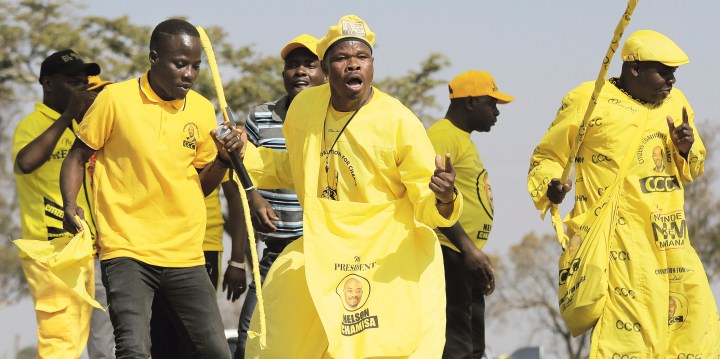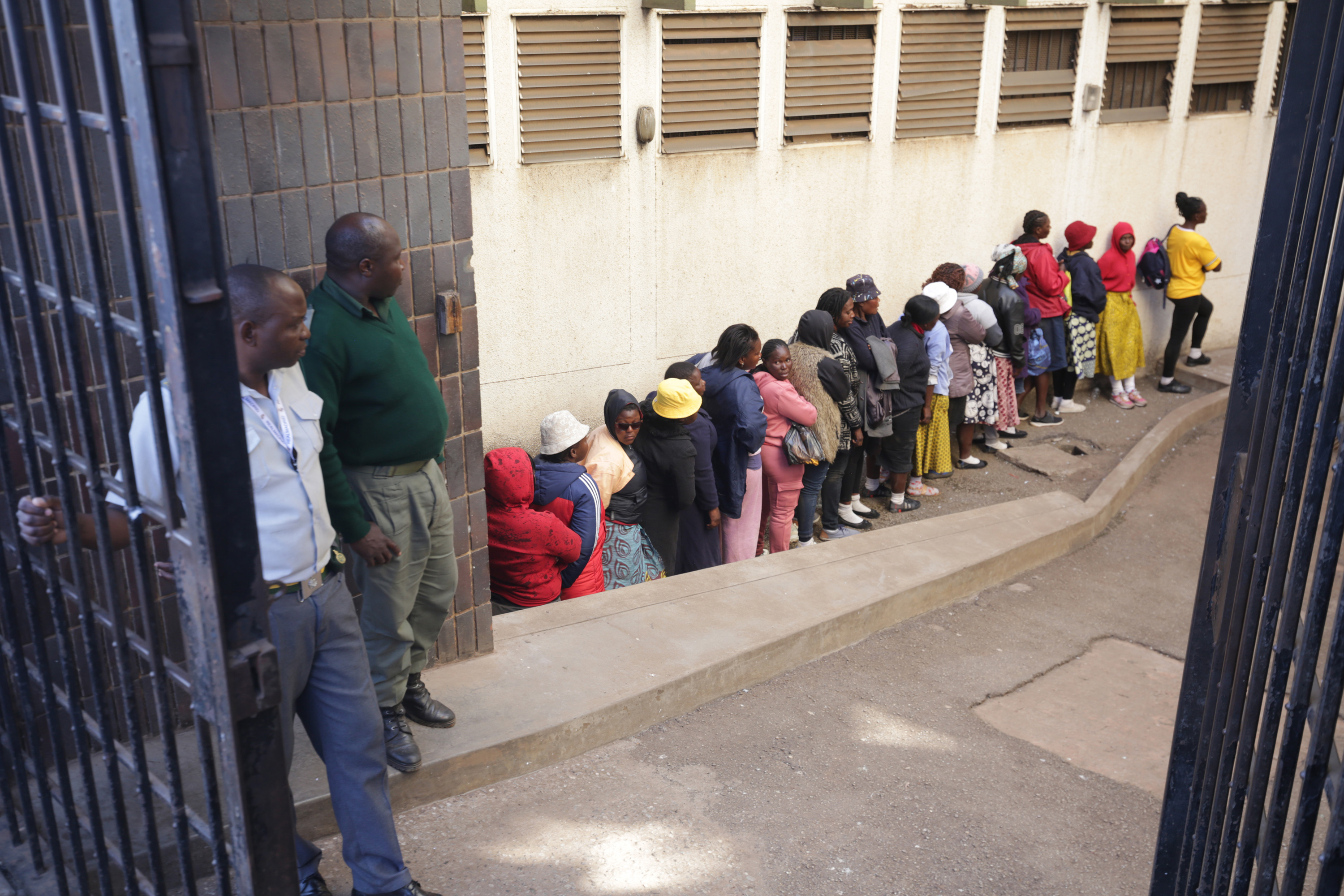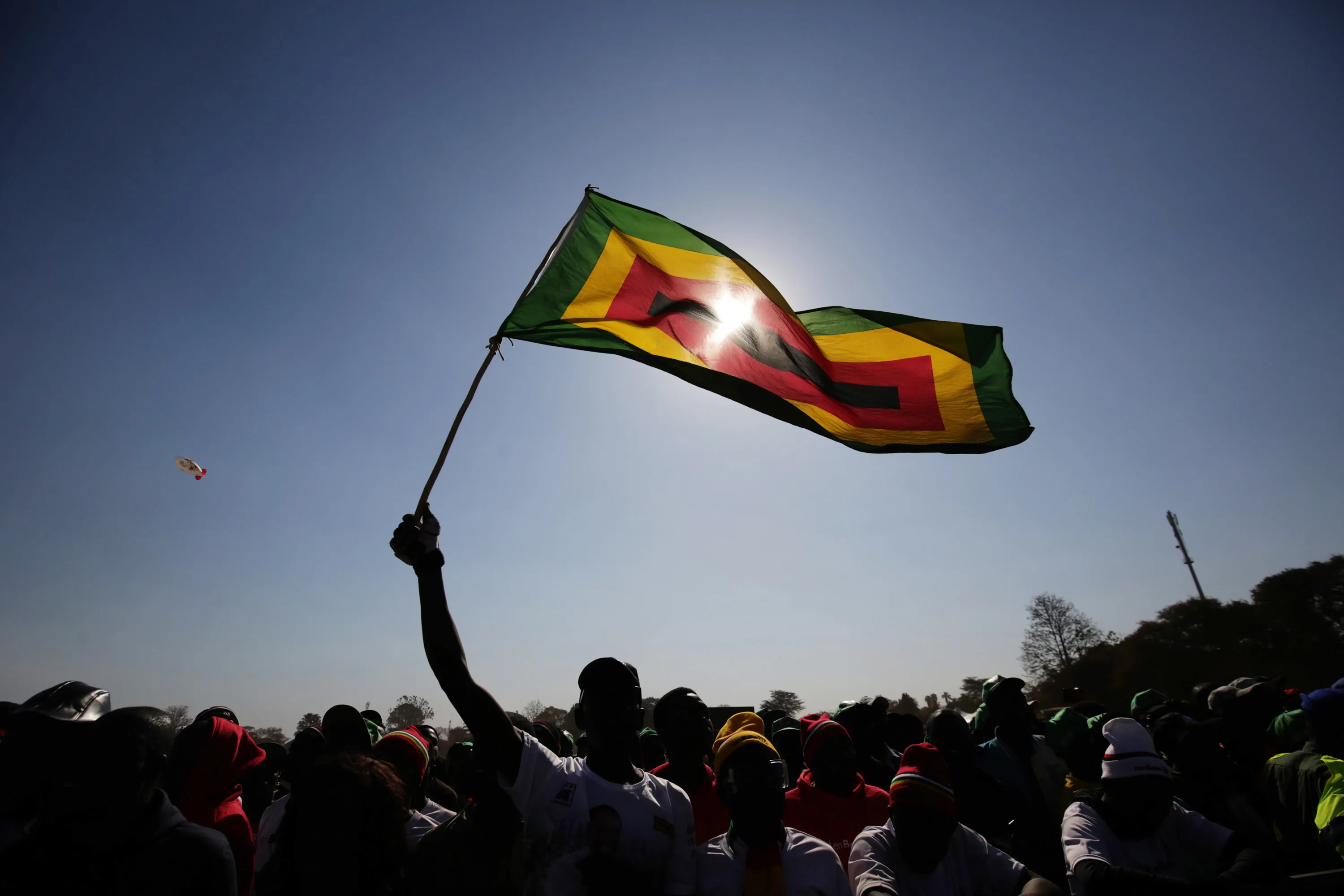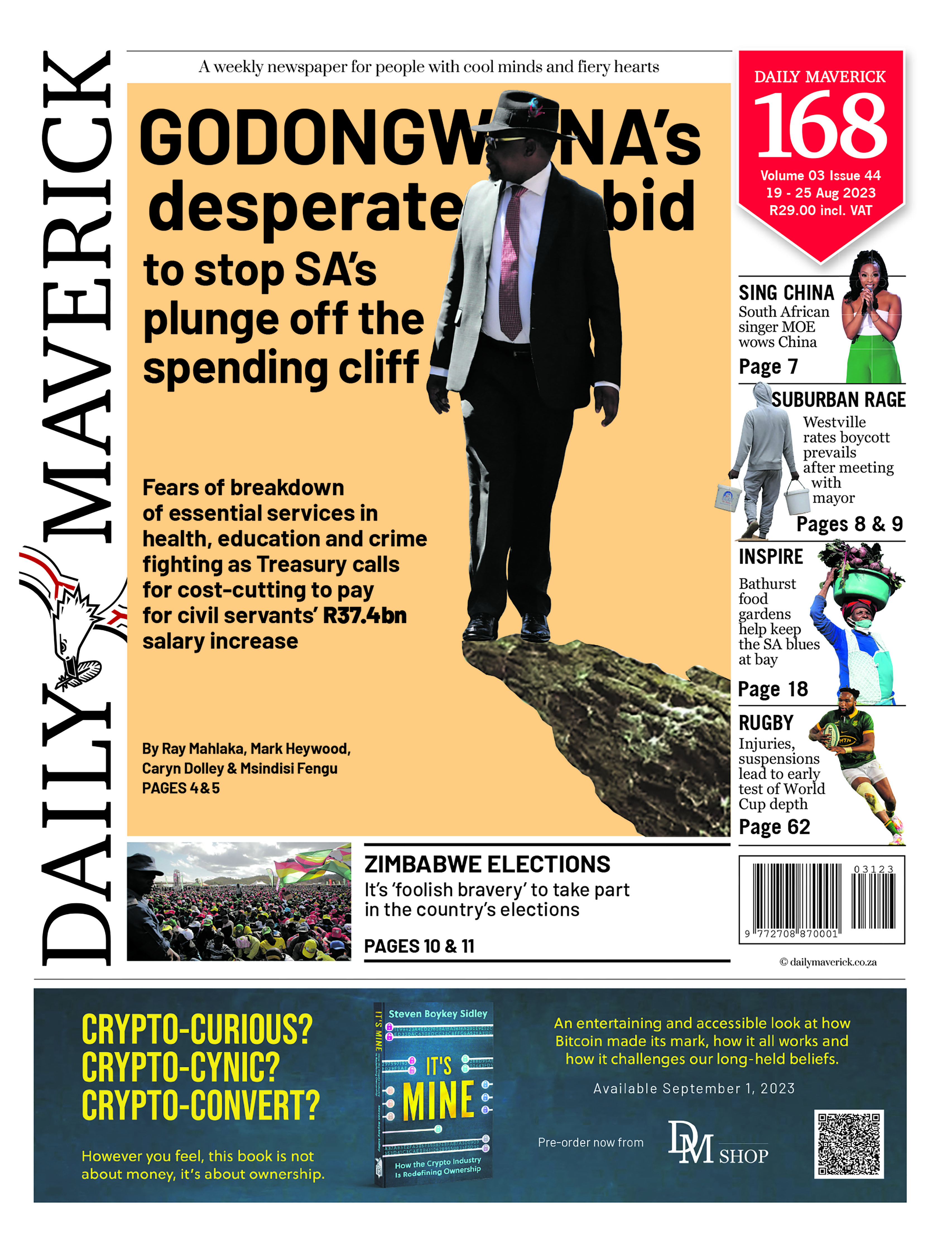TROUBLED POLITICAL POLLS
It’s ‘foolish bravery’ to take part in these Zimbabwe elections

In the run-up to voting day, the despairing opposition accuses the regime of thuggery and gerrymandering, while South Africa’s ANC takes the side of the Zanu-PF government. Please scroll down to read the sidebar: Zimbabweans in SA cannot vote.
Long-suffering Zimbabweans go to the polls on Wednesday, 23 August, abandoned by South Africa and the region to their almost certain fate of yet another five grim years of ruinous Zanu-PF government, no matter who wins the most votes.
Polls show that the elections for president, parliament and local councils could be very close, but few Zimbabweans or outside observers expect Nelson Chamisa and his Citizens Coalition for Change (CCC) party to form the next government.
President Emmerson Mnangagwa and his Zanu-PF – which has been in power since independence in 1980 – are not ready to relinquish it, most observers believe.
Worse than ineffective, the ANC under President Cyril Ramaphosa has now actively taken Zanu-PF’s side in the conflict by constantly reiterating that Western sanctions are the real cause of Zimbabwe’s economic ills
Mnangagwa and Chamisa will be facing off for the presidency for the second time since Mnangagwa came to power after a military coup ousted longtime president Robert Mugabe in November 2017.
In 2018, Mnangagwa officially won just 50.8% to Chamisa’s 44.3%, and Zanu-PF won 52.3% of the legislative vote to the 34.7% of Chamisa’s Movement for Democratic Change (MDC), as it was then called.
Many Zimbabweans feel betrayed by the regional intergovernment body, the Southern African Development Community (SADC), and particularly Zimbabwe’s big neighbour South Africa, which has abandoned its previous efforts to level the political playing field.
The last effort was in 2020, when both Pretoria and the ANC sent envoys to Harare to urge Zanu-PF to engage in real political dialogue with the opposition. But when Zanu-PF refused to allow the envoys to speak to the MDC, they turned tail and meekly went home, never to return.
Veteran Zimbabwean political analyst Brian Raftopoulos told a Southern African Liaison Office webinar this week that SADC would now only intervene in Zimbabwe if South Africa took the lead, as it had in 2008 when President Thabo Mbeki brokered a government of national unity between Mugabe’s Zanu-PF and Morgan Tsvangirai’s MDC after particularly violent elections in which the MDC beat Zanu-PF and Tsvangirai beat Mugabe in the first round.
Read more in Daily Maverick: Zimbabwe 2023 Elections
But then Zanu-PF unleashed a reign of terror, forcing Tsvangirai to pull out of the second round, giving Mugabe an uncontested victory. Tsvangirai famously said: “I cannot go to State House walking over dead bodies.”
But Raftopoulos said South Africa would not intervene in Zimbabwe now “because of the existential crisis of the ANC itself”.

Some of the 40 arrested opposition Citizens Coalition for Change members in a line as they arrive at the Harare Magistrate’s Courts on 17 August 2023. The 40, who include party aspiring Member of Parliament, Gladmore Hakata for Glenview South, were arrested for allegedly holding an unsanctioned car procession to solicit support ahead of the country’s elections. (Photo: EPA-EFE/AARON UFUMELI)
ANC has actively taken Zanu-PF’s side
Worse than ineffective, the ANC under President Cyril Ramaphosa has now actively taken Zanu-PF’s side in the conflict by constantly reiterating that Western sanctions are the real cause of Zimbabwe’s economic ills.
And last week ANC secretary-general Fikile Mbalula went further, branding CCC leader Chamisa as “America’s puppet”, because he was supposedly being used by Washington to unseat Mnangagwa and Zanu-PF.
An Afrobarometer survey conducted in April and May indicated that 37% of the electorate would vote for Zanu-PF and 28% for the CCC. But fully one in three – 34% – refused to reveal how they would vote or said they “don’t know”, suggesting that the election is still wide open, especially because many Zimbabweans are believed to be too afraid to tell anyone they intend voting against the ruling party.
Although election day is expected to be relatively uneventful, the run-up has already tilted the playing field unwinnably against Chamisa’s CCC, many analysts believe.
Late in the week, for instance, the CCC accused the Zimbabwe Electoral Commission (ZEC) of failing to run a transparent postal poll after uniformed members of the forces who will be providing security on voting day, as well as Zimbabwean diplomats abroad, were allowed to cast their ballots unannounced, making it hard for the opposition or observers to ensure the process was legitimate. Exiled former information minister Jonathan Moyo said it was unconstitutional for the ZEC not to have disclosed to political parties and candidates where the ballot papers were printed and by whom.
The CCC has also accused the ZEC of failing to provide it with the voters’ roll that will be used on voting day.
And it says Zanu-PF thugs have assaulted and intimidated its supporters, especially in the countryside, while police have arrested dozens of opposition members merely for canvassing electoral support.
“Regrettably, most of the international election observer missions will be short-term and, historically, observers have not been on the ground during the crucial periods around voter registration, candidate nominations and the campaign period.”
Police Commissioner General Godwin Matanga, however, maintains solemnly: “We have had a generally peaceful campaign so far except in some isolated incidents where violence was reported, but as the police we have managed to ensure that the security situation is stable and there is peace in the country.”
ZEC head Priscilla Chigumba insists the commission is ready to deliver a “free, fair and credible election”.
Boycotting the poll
Douglas Mwonzora, leader of a party that retains the name MDC after a split, is boycotting the poll, citing irregularities by the ZEC such as illegally drawing new boundaries in the middle of an electoral process.
Chigumba confirmed that the ZEC had increased the number of polling stations from 11,501 to 12,374 because it had found that the number of voters in many polling stations exceeded the 1,000 limit.
Mwonzora also called for other opposition parties to pull out of the elections because he said the outcome had been predetermined, citing the government’s failure to release census results, which were essential for delimiting constituencies.
“Participating in this election is an act of foolish bravery,” he said.
Chigumba said her commission had accredited more than 4,000 election observers, including missions from SADC, the African Union, the European Union, the Commonwealth and the US’s Carter Center.
The head of the SADC observer mission, former Zambian deputy president Nevers Mumba, said his mission was hoping to see a democratic election that would guarantee peace. Previous elections were marred by violence in the aftermath that claimed some lives after the opposition accused the ZEC of voter fraud.
The presence of observers from the EU and the Carter Center, who have in the past been more critical than African observers, has raised hopes of credible reports. But some political analysts said the observers had arrived in Zimbabwe too late for that.
Zimbabwean cherry-picking of accredited observers
Grant Masterson, an election expert with South Africa’s Electoral Institute for Sustainable Democracy in Africa, said: “The Zimbabwean government has regularly cherry-picked who is accredited and who is not, so whenever credible, respected international observer groups are accredited to observe elections in Zimbabwe, such developments are always welcome.
“Regrettably, most of the international election observer missions will be short-term and, historically, observers have not been on the ground during the crucial periods around voter registration, candidate nominations and the campaign period.
“Zimbabwe’s pre-election and post-election periods have been more contentious in recent elections than the actual election day period, so it’s hard to say that observer presence means anything by itself.”
Piers Pigou, head of the Southern Africa programme at the Institute for Security Studies, says observers who arrive in Zimbabwe just a few days before the election cannot assess the full election cycle.
Putting lipstick on a pig
“So in some ways observers can be part of the problem by putting lipstick on a pig, becoming enablers of continuing bad behaviour,” he says.
Meanwhile, George Charamba, deputy chief secretary to Mnangagwa and the Cabinet, has warned that foreign election observers who interfered in the elections would be deported without hesitation.
This was after state-owned The Herald newspaper reported that “some individuals with a chequered history in observing elections in a number of countries came to Zimbabwe under the umbrella of the US government-funded Carter Center and have recently been addressing rallies held by the opposition”.
The Herald story concluded: “There are concerns that some of the so-called observers are on a mission to discredit the polls.”
Admitting election observer missions like the EU, the Carter Center and the Commonwealth – even if they are “being kept on a short leash”, as one expert said – suggests Mnangagwa is hoping for positive assessments that could help to lift the remaining US sanctions and get Zimbabwe readmitted to the Commonwealth, which it walked out of in 2003 to pre-empt expulsion.
“The EU is seemingly the darling of the Mnangagwa regime right now,” said one analyst, anonymously. “They have even started pushing for an end to smart sanctions, which is astonishing. But Europe has bigger issues to worry about than Zimbabwe right now, and if a regime is friendly to the EU, it’s not cosying up to Russia or Wagner.
“The US government and UK are still very much in favour of retaining smart sanctions, hence the Mnangagwa regime’s relatively new-found infatuation with Brussels.”
Pigou thinks it is unlikely that the US will be impressed, especially in view of acts such as the conviction and imprisonment of CCC MP Job Sikhala in what Amnesty International has called a “travesty of justice”.
Killed any chance of US sanctions being lifted
He also believes Mnangagwa’s statement at the recent Russia-Africa summit supporting Russia’s invasion of Ukraine would have killed any chance of US sanctions being lifted, and perhaps also the EU’s smart sanctions. Pigou believes many Commonwealth members would like to readmit Zimbabwe but also thinks this is unlikely.
One of Mugabe’s Cabinet ministers, Saviour Kasukuwere, who was prevented from entering the presidential race when the courts ruled that he had lived outside the country for too long, called on election observers to be especially vigilant about violence by Zanu-PF thugs.
Veteran analyst Tony Reeler, senior researcher at the Research and Advocacy Unit in Harare, told the Southern African Liaison Office webinar that “the lack of interest by citizens in these elections is based both on fear and a total lack of political trust in the state, the government, political parties. But the fear is based on 23 years of being traumatised by direct violence and living in terror, especially around elections.”
Raftopoulos suggested that a peaceful election day would prove little as “the absence of overt violence does not mean the absence of oppression. Oppression can take a broader form … and we have seen that in the broad areas in which Zanu-PF has intervened in trying to cut off civic spaces.”
He said Zanu-PF had systematically tried to dismantle both the opposition and civil society “through various forms of lawfare, of removal of funds, of dividing the opposition and this use of the narrative of sanctions to legitimise its stance on the continent and in the region”.
And this week Zimbabwe denied media accreditation to several foreign journalists, including Daily Maverick, which had intended to cover the elections.
Despite what appear to be impossible odds, CCC spokesperson Fadzayi Mahere told Daily Maverick: “We are ready to win Zimbabwe for change; key democratic reforms have not been instituted, we are not being given fair access to the media, there are no security sector reforms and the citizens continue to be subjected to violence, intimidation and harassment in several parts of the country.
“But we know that Zanu-PF cannot win in a free and fair election.” DM

A supporter of Zimbabwean President and Zanu-PF leader Emmerson Mmangagwa (unseen) waves a flag during an election campaign rally in Harare on 9 August 2023. Zimbabweans will be heading for elections on 23 August. (Photo: EPA-EFE/AARON UFUMELI)
Zimbabweans in SA cannot vote
Zimbabweans living in South Africa will not be able to vote in the elections on Wednesday, unlike the citizens of many other countries whose embassies offer the option.
South Africa is home to more than 700,000 Zimbabweans, according to preliminary data released by the Zimbabwe National Statistics Agency.
The current legislation governing election practices bars citizens outside Zimbabwe from voting unless they are prepared to cross the border back into Zimbabwe. Returning to Zimbabwe equates to high travel costs, something that is unaffordable for many living in South Africa.
The Zimbabwe Diaspora Vote Initiative suggested that embassies should host diaspora votes to prevent the need for some to travel to Zimbabwe. Luke Mufaro Dzviti, chairperson of the Zimbabwe Immigration Federation, claimed the recommendation was not feasible owing to the “very limited capacity of embassies”.
He said the government would have to book other venues with the necessary capacity in all the respective countries, increasing the costs associated with elections.
Daily Maverick spoke to a number of Zimbabweans in South Africa to get their take on the looming elections. They didn’t want to be identified because they say political matters are sensitive and they are concerned about their safety and that of their families.
One interviewee, a manager of educational programmes, said: “Zimbabwe will never have a free and fair election. There’s too much rigging and stuff happening on the ground.
“The ruling party [Zanu-PF] doesn’t want anything to do with the opposition parties; they don’t want to be challenged. So I feel like voting is just a waste of time because a lot of corruption will happen, and the ruling party will stay forever.”
Most of the Zimbabweans interviewed said they only occasionally visit home, but they remain in contact with their family members through phone calls and WhatsApp. Communication is difficult for those with relatives in the rural areas because of poor network quality or no connectivity.
All those who spoke to Daily Maverick said that, if they were able to vote, it would be for an opposition candidate. All the respondents expressed concern about the wellbeing of their families in Zimbabwe owing to the dire political and economic circumstances, which are the reasons for their migration.
“I am worried. They are not free to express themselves as I am [in SA],” said one interviewee. Like other respondents, he misses home and wants to resettle in Zimbabwe, but only after noticeable improvement there. – Gaby Ndongo/DM
This story first appeared in our weekly Daily Maverick 168 newspaper, which is available countrywide for R29.




















 Become an Insider
Become an Insider
Many many South Africans are with you in spirit Zimbabwe and are praying for a fair democratic Zimbabwe for all your citizens.
Please DM, do NOT publish ANYTHING from Thabo Mbeki post these elections, after the untold damage that he allowed to happen under his watch. Block the man from ever presenting his opinion on Zimbabwe elections ever again.
I long for the freedom that authentic elections will bring to our neighbours, so that the current rot can be excised and thereby provide a beacon of example to those of us with so little hope for our own situation.
Even if they are voted out, ZANU PF will not give up power easily. ZANU PF politicians (and the people that depend on them) will not give up power as this is intricately linked to the gravy train. Just money money money for the new African aristocrats and no thought for ordinary citizens. They are clearly quite happy to run the country into the ground (to the detriment of their neighbours) as long as they can keep their pockets full. I think that DM should do an expose on these Zim fat cats. I think we will be shocked at how much they are worth.
And that, my fellow citizens in SA, is exactly our future. Anyone who believes we live in a democracy is incredibly naive.